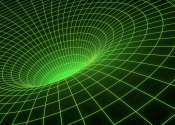Did physicists make a wormhole in the lab? Not quite, but a new experiment hints at the future of quantum simulations
Scientists made headlines last week for supposedly generating a wormhole. The research, reported in Nature, involves the use of a quantum computer to simulate a wormhole in a simplified model of physics.









